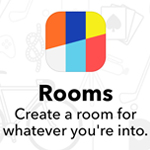 As the internet becomes more mobile, people are using their mobile devices more than they do on traditional desktop computers to surf the web. The internet has grown rapidly because people are sharing their thoughts and information in it, and as more people are using their mobile devices more than often, they are drifting away from the internet's original idea. To remind people of what the internet should be, or was, in the first place, Facebook introduces an anonymous app the company calls 'Rooms" to embrace the crowd of nameless sharing.
As the internet becomes more mobile, people are using their mobile devices more than they do on traditional desktop computers to surf the web. The internet has grown rapidly because people are sharing their thoughts and information in it, and as more people are using their mobile devices more than often, they are drifting away from the internet's original idea. To remind people of what the internet should be, or was, in the first place, Facebook introduces an anonymous app the company calls 'Rooms" to embrace the crowd of nameless sharing.
Facebook has been trying to divide the functions of its core services with its founder Mark Zuckerberg once said by "unbundling the big blue app", initiated by its Creative Labs division. However, the standalone app that is meant to be anonymous is a new thing for the social network giant.
Rooms is Facebook's version of internet chatrooms in the early days of the internet. Rooms is for people to communicate anonymously, on the go.
Rooms, unlike Facebook, allows pseudonyms. This is the first thing needed for an anonymous identity, and this is a major departure from Facebook's policy that always insisted in people using real names.
Nowadays, internet services need your credentials to identify you from other users. This information is needed so you can connect with others that you know, already using the services. This ecosystem is extremely good in connecting people. But for those that concerns privacy, and prefer to use pseudonyms for anonymous communication, using real names, like in Facebook's core service's policy, is not appealing.
“Our whole thing is creating corners of the internet for people like you," said Josh Miller, Product Manager for Rooms, whose startup Branch was acquired by Facebook.
Rooms is about chatting with people. But instead of being an anonymous chatting with friends, or with nearby people, Rooms is an app to chat with people you care about, explained Miller. Rooms is all about building identity, but outside of Facebook.

Inside the app, users can create a "room" on any topic by choosing a theme for it. The room can then be customized with colors, icons and photos - including changing the looks of the Like button. Text, photos and videos can be then posted to a room's feed, creating an ongoing multimedia conversation.
The goal is to transfer the utility of message boards to the mobile world.
"A room is a feed of photos, videos, and text - not too different from the one you have on Instagram or Facebook - with a topic determined by whoever created the room," said Facebook in its post.
The chats are an invite-only basis, and users can join a new room by using a circular QR code that existing Room members can pass along by posting it anywhere online or offline. People can join the room by taking a photo or a screenshot of the code, which will be then recognized by the app.
The Rooms app is the standalone app that emerges from Facebook's Creative Labs. Before, the division has created several standalone apps such as Slingshot and Paper.
As a standalone app, Rooms is seen in a glance, does not represent a Facebook's product. It has no Facebook branding and, and users don't need Facebook account to use it.
Rooms is meant to be a platform for chatrooms, similar to how WordPress or Tumblr serve as platforms for websites, continued Miller.
The app that runs invisible, operating in the background does come with issues. Mainly because pro-anonymous apps are known to be unsafe for users. Facebook needs to monitor the safety of users because anonymous app can hide user's identity, potentially becoming a place for bullying. To prevent that from happening, the app includes moderation tools for room creators to review posts before they're published, or set an age limit for it. Other users can also help by flagging inappropriate posts, which will be reviewed by a team of moderators.
Each room can also be customized to a certain level of privacy, including whether or not the room's post can be discovered on search.
Despite being an anonymous app, Facebook kept its standard for the Rooms app. With the exception of identity, Facebook asks for the user's email, but providing one is not mandatory. User information is stored simply as a backup in case you lose your account, said Miller.
Rooms does not track user locations. And messages are stored on Facebook servers.
"Now you can connect with people anywhere around the world who like something as much as you do," said Miller.